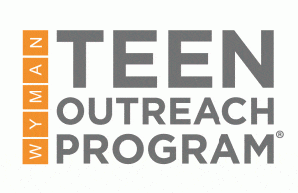Research shows that a service learning program implemented into middle school curriculum is having an impact on both academic and social behaviors in seventh-graders – particularly those who have been deemed most at risk of difficulties in school.
A research team from the Center for Social Development (CSD) at Washington University in St. Louis is examining the impact of the Wyman Center’s Teen Outreach Program (TOP) on seventh-grade students in a St. Louis County middle school. The researchers, led by Amanda Moore McBride, PhD, are collecting data through a longitudinal, comparative study that uses a range of survey, interview, focus group and school data to answer key questions between the intervention school and a school that is not implementing the program. They recently released a research report on survey results from the intervention’s first year.
“This is one of the only studies to focus on the integration of service learning at the middle school level. At this critical developmental stage in adolescence, we want to know if a pedagogy that gives youth the opportunity to apply what they learn in the classroom promotes academic performance and other social-emotional outcomes and may prevent problems later on,” says McBride, associate professor and associate dean for social work at the George Warren Brown School of Social Work (Brown School) at Washington University and research director for CSD.
The Wyman program includes weekly lessons conducted by certified TOP facilitators. These facilitators include Brown School masters-level social work students, who have received certification and are providing the facilitation as part of their training in youth development. The weekly lessons are integrated into social studies classes during the regular school day. Discussion topics include decision-making, building healthy relationships, communication, and social and physical development. TOP also includes service activities designed to promote application of these topics, as well as civic and neighborhood connections.
Student survey data from the first year of TOP suggests the intervention had the most significant impact on students’ academic performance, including reported reductions in failing grades, suspensions and cutting classes. Researchers also found significant differences when it came to academic performance for at-risk students specifically, with those students reporting the greatest improvements. They were also most likely to experience the greatest gains in reported civic and social connectedness. While the research team recognizes that this type of universal intervention may not impact each individual student, the changes they are seeing among at-risk students can contribute to the climate of the entire school.
The research team is continuing to follow these students into high school. In addition to assessing the outcomes on students, future reports will also focus on the process of integrating service learning within established curriculum.
Read the full first-year research report here.